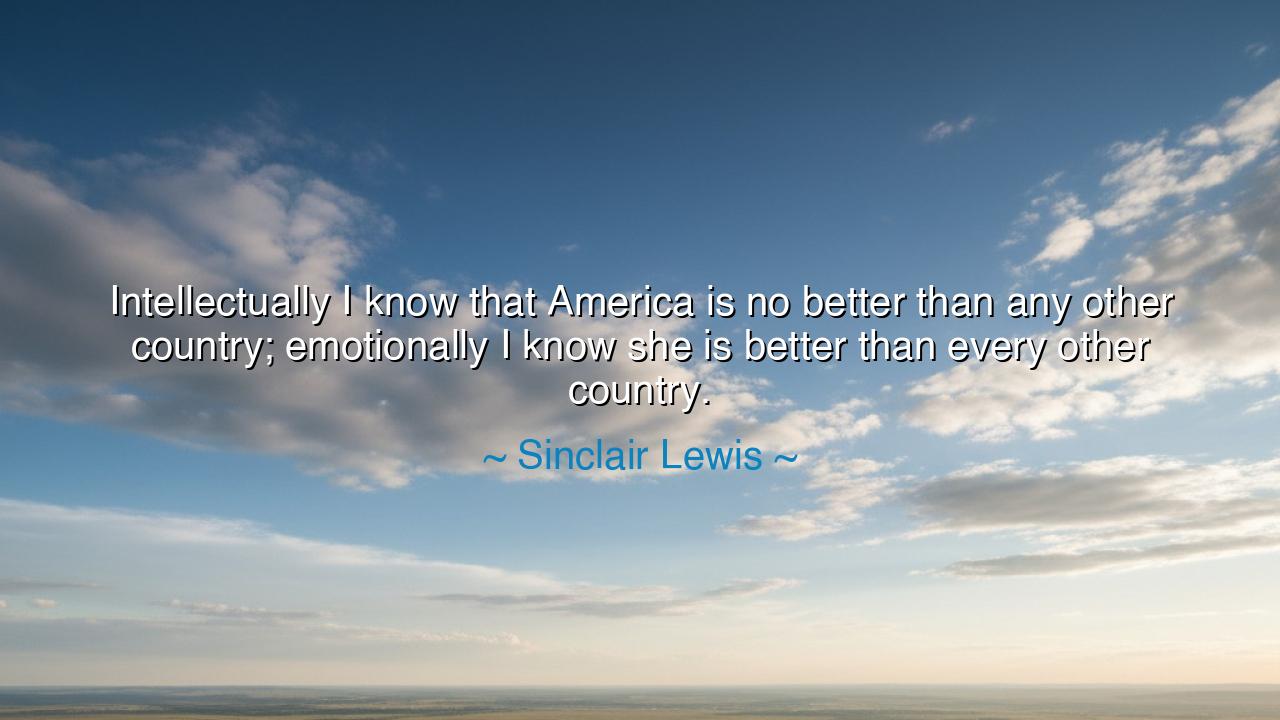
Intellectually I know that America is no better than any other
Intellectually I know that America is no better than any other country; emotionally I know she is better than every other country.






The words of Sinclair Lewis—“Intellectually I know that America is no better than any other country; emotionally I know she is better than every other country.”—resound with the tension between mind and heart, between reason and love. They are the confession of a man who sees with clear eyes the flaws of his nation, yet cannot escape the pull of devotion that binds him to her. This is the paradox of patriotism: the ability to recognize imperfection, yet still to love with a passion that no argument can quench.
At the heart of this quote lies the dual nature of truth. Intellectually, Lewis acknowledges what the historian and philosopher know—that nations are made by men, and men are frail, prone to injustice, greed, and error. No country is wholly righteous; all stumble, all fall short. But emotionally, he admits another truth, one that reason cannot erase: that love of country is visceral, instinctive, and powerful, like the love of a parent for a child. One may see faults clearly, yet the heart insists on devotion.
History offers us many examples of this paradox. During the darkest hours of the Civil War, Abraham Lincoln confessed his anguish over a divided America, acknowledging her deep sins in permitting slavery. Yet even as he saw with sharp intellect the nation’s failures, his heart still declared her worth saving. His speeches carry the same tone as Lewis’s words: clear-eyed about flaws, yet emotionally convinced that America must be preserved, not destroyed. Here again, the intellect knows imperfection, but the heart refuses to surrender love.
This paradox is not unique to America; it belongs to all who love their homeland. Consider the Poles of the 19th century, partitioned and conquered, who knew that their state was shattered and weak. Intellectually, they might have admitted defeat. Yet emotionally, they clung to their identity, proclaiming Poland’s greatness in poetry and song, sustaining the nation’s spirit until freedom was restored. In them we see Lewis’s truth: love of country is not always rational, but it is enduring, and often redemptive.
The ancients too would understand this tension. Cicero, in praising the Roman Republic, could not ignore its corruption, yet he still exalted its virtues above all others. Aristotle declared that man is by nature a political animal, bound to his polis not only by logic but by love. To them, as to Lewis, loyalty to country is both an intellectual recognition of shared order and an emotional bond that defies reason’s coldness. Patriotism, in its fullness, unites both faculties.
The lesson for us is that true patriotism is not blind. It is not the denial of flaws, nor the pretense that one’s nation is perfect. It is the union of intellect and emotion: the courage to see what is wrong, yet the devotion to believe in what is right. The patriot must balance reason’s honesty with the heart’s loyalty, lest he fall into either cynicism or blind zeal. To love one’s country rightly is to hold her accountable to her ideals while never abandoning her in her struggles.
In daily life, this means we must not turn away when we see injustice in our homeland. We must acknowledge it with clear intellect, yet remain emotionally committed to working for change. It means loving our nation not only when she triumphs, but also when she stumbles—believing that she can rise again. It means acting as both critic and defender, never surrendering our reason, and never surrendering our love.
Thus let Sinclair Lewis’s words echo across the ages: to know intellectually that a nation is no better, yet to feel emotionally that she is greater, is the paradox of patriotism. Let us embrace both truths, for in the union of intellect and emotion lies the power to love deeply, to see clearly, and to serve faithfully. And in this paradox we discover not weakness, but the enduring strength of devotion.






AAdministratorAdministrator
Welcome, honored guests. Please leave a comment, we will respond soon